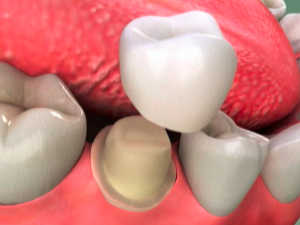Dental Crowns, often referred to as dental caps or tooth caps, may be the answer if you are looking for a cosmetic fix for missing, broken or misshapen teeth. The key to successful cosmetic or restorative dentistry such as the placement of dental crowns is to avoid having it look like any dental procedure has been performed. Our goal at Gover and Gover Dentistry in Raleigh is to provide dentistry that is completely natural looking. In addition to placement of new crowns, we replace existing crowns and fillings with restorations that look and feel like your natural teeth.
In cases where damage to a person’s teeth is severe, even cases that may appear to be beyond repair, we can use porcelain crowns to make the smile appear “good as new.” In fact, crowns are used for repairing some of the most severe of dental problems, even permanently replacing missing teeth to offer a complete smile and restore a functional bite. These are highly functional, long-lasting corrective treatments that can last for 20 to 30 years, which is basically permanent.
How long does it take to get crowns?
Fitting a dental crown is a multi-step process requiring at least a couple of dental visits. Initially, we will remove any tooth decay, shape the host tooth, and fit it with a temporary crown.
On the subsequent visit, the temporary crown is removed and then the tooth is fitted with the final crown. After any adjustments in the fit, the new permanent crown is cemented into place. The result is a brand new tooth and beautifully restored smile.
Benefits of Dental Crowns
- Replace missing teeth and restore functional chewing capability
- Offer support or restore strength to misshapen or broken teeth
- Natural looking restoration
- Fix smile
What can be achieved with dental crowns?
Crowns and bridges are found to be reliable solutions for major dental problems attributable to accidents, diseases, neglect and/or wear and tear. Making use of these techniques allows us to correct fairly major dental problems. The material used in these repairs is either high-grade porcelain or porcelain bonded to gold or metal alloy. The porcelain bonded to metal offers higher strength and is usually recommended for the most serious dental problems where maximum strength is required. The forces encountered by the rear teeth from chewing and eating, for instance, make the porcelain/metal crown a more sensible choice for strength and durability. Front teeth however often will work incredibly well with an all-porcelain crown. Crowns are also a good choice where accidental damage has occurred resulting in lost teeth, where teeth have broken away through excessive wear, or maybe where old fillings have broken.
Additional benefits of crowns
Pain relief is one of the benefits for patients with unseen hairline cracks in the chewing part of back teeth. Often the fillings in back teeth cause unexplained pain. Placing crowns on these back teeth functions to seal the tooth against further damage and provides relief from the pain while returning full dental function.
Esthetic improvement in front teeth is possible with crowns to fix weakened teeth with older fillings that exhibit staining or chipping. Porcelain crowns and bridges are suitable here where porcelain veneers may not be adequate.
Lastly, in teeth with root canal fillings, dental crowns can prevent breakage and hide the discoloration that can show through the affected tooth.

